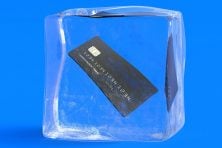Dear Penny: I’m Back in Debt Just 3 Months After Paying Off My Credit Cards

I paid off my high-interest credit cards with a personal loan in August. By November, I got them back up again. Now I have a personal loan payment plus high-interest credit card payments! What is wrong with me? Where can I turn to for help?
-E.
Dear E.,
Instead of asking what’s wrong with you, a better question to ask is what’s wrong with your budget? When you spend more than you earn, you wind up with debt.
Consolidating credit card debt with a personal loan can help to an extent. You often wind up with lower monthly payments and interest rates. Plus there’s the convenience factor, since you’re replacing multiple bills with a single monthly payment.

Ask Dear Penny!
Get practical money advice from Dana Miranda, the voice of Dear Penny and a Certified Educator in Personal Finance.
DISCLAIMER: Questions will appear in The Penny Hoarder’s “Dear Penny” column. We are unable to answer every letter. We reserve the right to edit and publish your questions. But don’t worry — your identity will remain anonymous.
But a debt consolidation loan isn’t going to get to the root of the problem. When you haven’t changed your spending habits, you haven’t treated the underlying disease.
In fact, if chronic overspending is the issue, a debt consolidation loan can actually exacerbate the problem. You free up credit, which gives you more room to spend. If you haven’t budgeted properly for the loan payment, you may wind up using your credit card for even more expenses.
Also, consolidating credit card debt into a loan often improves your credit score, which is generally a good thing. But good credit makes it easier to obtain new credit. That can be problematic when you struggle to manage debt.
A good first step is to meet with a credit counselor. The National Foundation for Credit Counseling and the Financial Counseling Association of America maintain directories of reputable agencies, most of which are not-for-profits. They can help you make a budget, decode your credit reports and form an action plan for tackling your debt.
The best solution will depend on how much debt you have relative to your income. If you make more than enough to cover your minimum monthly payments, this may be a problem you can still solve with self-discipline alone.
You could make it harder for yourself to make new credit purchases by freezing your credit accounts. When you freeze a credit card, you can’t make additional purchases, but the account remains open and you can continue making payments. (Note that freezing a credit card is different from freezing your credit. The latter makes it so lenders can’t look up your credit reports and is typically used to safeguard against identity thieves who may apply for credit in your name.)
You can use a debit card or cash to pay for your expenses. If you can earn extra money through a side gig or taking on more hours at your current job, you may be able to dig your way out of this hole fairly quickly.
But if these steps aren’t enough to rein in your debt, you may be a good candidate for a debt management plan. It’s a plan that a credit counseling agency negotiates on your behalf with your creditors. You’ll pay off your debt in three to five years.
As with a debt consolidation loan, a debt management plan often lowers both your interest rates and monthly payments. But the key difference is that most credit card companies will require you to close your accounts as part of the agreement. You also typically can’t take on new credit while enrolled in a plan. I should note that closing accounts can hurt your credit score in the short term. But focus on the long-term goal, which is to stop using credit to finance a lifestyle you can’t afford.
If your debt has ballooned out of control, you may need to look into bankruptcy. This is a last resort, of course. But bankruptcy is typically something to consider when your debt exceeds 50% of your income.
None of these suggestions will prevent a repeat of this situation if you don’t address why you’re spending more than you make. Sometimes, the fix is relatively simple. Maybe you need to make it harder for yourself to spend money on credit cards or build some savings so you’re not turning to credit every time you face an unexpected expense.
But spending excessively can often be a symptom of a deeper problem. A good resource — which several readers have recommended over the years — is Debtors Anonymous, a 12-step-based program for people whose lives have become unmanageable due to debt. You can find face-to-face and online meetings.
Getting out of debt is tough, but many people find that staying out of debt is even harder. The latter requires an ongoing commitment to living below your means and finding joy in things that don’t involve spending money. There are plenty of options for getting out of debt. But if you don’t figure out what’s causing this pattern, you’re treating the symptoms but not the illness.
Robin Hartill is a certified financial planner and a senior writer at The Penny Hoarder. Send your tricky money questions to [email protected].
- Dear Penny: My Dad Spends Up to $30K/Month. Could I Be Liable for His Debt?
- Dear Penny: Was My Cousin Allowed to Buy Life Insurance on My Mom?
- Dear Penny: Can I Sue My Ex for $500? I Hacked His Phone. I Know He Can Pay
- Dear Penny: Can My Deadbeat Son Fight My Decision to Disinherit Him?
- Dear Penny: Am I a Bad Mom if I Don't Co-sign My Daughter's $800K Mortgage?


















